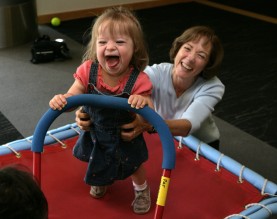Why is Research for People with Down Syndrome Important?

Physical therapist Pat Winders works with a young client at the Anna and John J. Sie Center for Down Syndrome
Down syndrome is a known quantity – it is when a person is born with three copies of chromosome 21 instead of the usual two, called triplication. Therefore, scientists can better develop methods to understand how the triplication leads to a higher incidence of certain diseases and protects those same individuals from other diseases. This should also allow scientists to discover the mechanism leading to cognitive delay.
Such research is important for people with Down syndrome for many different reasons.
Research on how many people with Down syndrome have certain conditions or diseases, or what interventions or medications work for people with Down syndrome would help to update medical guidelines such as Health Supervision for Children with Down Syndrome and the GLOBAL Medical Care Guidelines for Adults with Down Syndrome. This in turn would improve how doctors, parents/caregivers, and in some instances self-advocates themselves handle the health care needs of people with Down syndrome.
Medical or clinical research can improve the health and lifespan of people with Down syndrome. Such individuals are predisposed to certain medical conditions – an estimated 50% will be born with congenital heart defects, upward of 70% are estimated to have sleep apnea, and up to 50% will have the early onset of Alzheimer’s disease. By researching the effects of triplication of chromosome 21 in a large Down syndrome population base, scientists can more handily help identify the causes of such medical conditions and help identify interventions or cures. This has the added benefit of helping tens of millions of typical people who have the same conditions or diseases. Conversely, it is rare for a person with Down syndrome to have a solid tumor cancer or cardiovascular disease, including heart attack and stroke. In the same way, scientists can study people with Down syndrome to understand the protective mechanism occurring as a result of the triplication of chromosome 21.

Physical therapist Pat Winders works with a young client at the Anna and John J. Sie Center for Down Syndrome
Basic or laboratory research goes hand-in-hand with medical or clinical research. Before a scientist can test an intervention treatment on people, it must be tested in the lab first. For example: neuroscientists can ask how brain cells in a person with Down syndrome are different than brain cells in a typical person, and with the triplication of chromosome 21, geneticists can investigate how certain proteins are over-expressed or under-expressed.
Developmental or therapeutic research is also very important. For example, early adoption of the appropriate physical and speech therapies for babies with Down syndrome can make a major difference in a child’s physical and intellectual development. More research is needed to understand interventions for older children and adults and to understand how individuals with Down syndrome best learn to read, do math, or hold a job.
Research is important for people with Down syndrome, especially since Down syndrome is the least funded genetic condition by the National Institutes of Health (NIH). The funding for Down syndrome research at the NIH started a continual and precipitous decline in the year 2001. However, NIH’s National Institute of Childhood Health and Human Development is now working hard to correct the disparity of funding benefitting people with Down syndrome and is taking the lead on educating the other Institutes at NIH.
To learn how you can support research funding for Down syndrome click here.

 Experience our inspirational and groundbreaking videos and photos. Our children and self-advocates are beautiful AND brilliant!
Experience our inspirational and groundbreaking videos and photos. Our children and self-advocates are beautiful AND brilliant! Make sure your local Representatives are on the Congressional Down Syndrome Task Force.
Make sure your local Representatives are on the Congressional Down Syndrome Task Force.